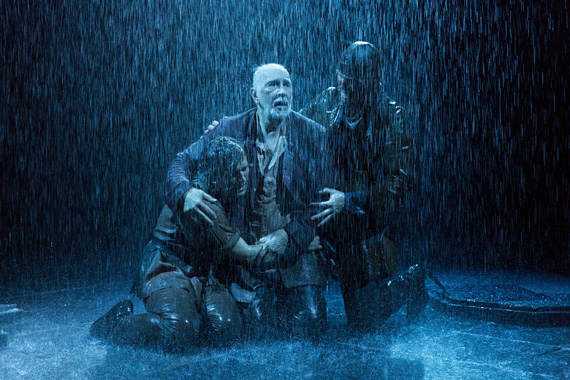
(© Richard Termine)
A truly great play gives you something new with each viewing. Shakespeare's King Lear is undoubtedly one of the greatest from an already much-lauded playwright. The Chinchester Festival Theatre production, which stars Frank Langella in the title role, emanates a freshness that invades your nostrils from the very earliest moments. This riveting and violent Lear is now making its U.S. premiere at BAM's Harvey Theater. It's a revival of a classic that few are likely to forget.
From the moment you step into the theater, director Angus Jackson grabs hold of your imagination, refusing to let go for the next three hours. Designer Robert Innes Hopkins sets this Lear in a stone hall surrounded by wooden columns, charred in this world lit only by fire. Paint peels from a large wooden throne with a plush red cushion. None of it looks out of place in the shabby-chic Harvey, extending this throne room into the cavernous house. An indented map of Britain dominates the stage, never letting us forget what is at stake. The Lords and Ladies of the play stomp all over the country like giants, wreaking havoc as they battle for control. Is it any wonder that the lowest-status characters (the fool, guards, and servants who actually have to live in this war-torn country) all seem to have a better grasp of what is actually going on than their "betters"?
King Lear is Shakespeare's tragedy of ensconced power propped up by delusions of intrinsic superiority. The play begins with Lear, the aging King of Britain, dividing his Kingdom among his three daughters. After hearing a lot of flowery words of love, Lear grants the northern third of Britain to his eldest, Goneril (Catherine McCormack), wife of the Duke of Albany (Chu Omambala). The southern third goes to his middle daughter, Regan (Lauren O'Neil), wife of the Duke of Cornwall (Tim Treloar). When his youngest daughter, Cordelia (Isabella Laughland), refuses to flatter her father as her older sisters have, Lear disinherits her and divides the middle part of the Kingdom between Regan and Goneril. Yet while Lear is no longer interested in the business of governing, he still wishes to command the respect of a King. He finds that increasingly difficult under his daughters' reigns, as he watches his worldly power slip away.
"Thou shouldst not have been old till thou hadst been wise," The Fool (Harry Melling) admonishes the King, and few wonder which of the two is the bigger fool. Langella gives us a Lear full of sound and fury, itching for a fight. Yet his hand-wringing asides let us know that he is privately terrified. This Lear invokes the gods for support, but receives no answer. His daughters call the old man's bluff and circle him like hungry wolves (McCormack and O'Neil are well-matched in icy brutality), stripping him of his power and dignity.
The chaos of transition offers a perfect opportunity for a ruthlessly ambitious upstart like Edmund (Max Bennett), the "bastard" son of the Duke of Gloucester (Denis Conway). He plots the downfall of his father and "legitimate" brother Edgar (Sebastian Armesto) as he builds his influence and position by exploiting the insecurities and vanities of the powerful. (He seduces both Goneril and Regan in the process.) It helps that Bennett is underwear-model attractive, but behind that buzz cut and piercing gaze is a brain full of machinations. In a world full of superstition and gods, Bennett's Edmund is an atheist. He believes only in himself and mocks the faith of those around him. Bennett lives comfortably in that ever-elusive sweet spot of villainy: No matter what awful things he does, a portion of the audience secretly wants this underdog to succeed.
And when all the characters are violent and awful, why not pick as your favorite the prettiest and smartest? Jackson's Britain is an unforgiving jungle, where all the animals wear doublets and thigh-high boots. Natural elements of earth, water, and fire pervade, including a visually arresting rainstorm that occurs during Lear's "Blow, winds" speech. Before he divided his kingdom, the King was protected from these elements not by his intrinsic power but by his crown. The real tragedy of Lear is that he never realizes that until it's too late. This isn't the story of a man losing his mind, but coming into it fully for the first time.









